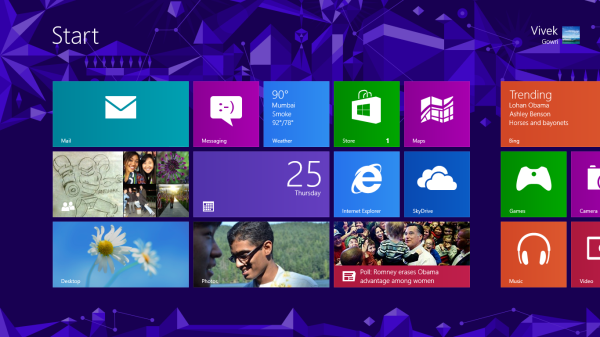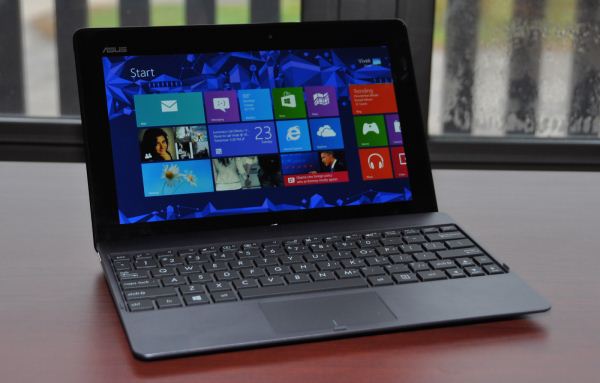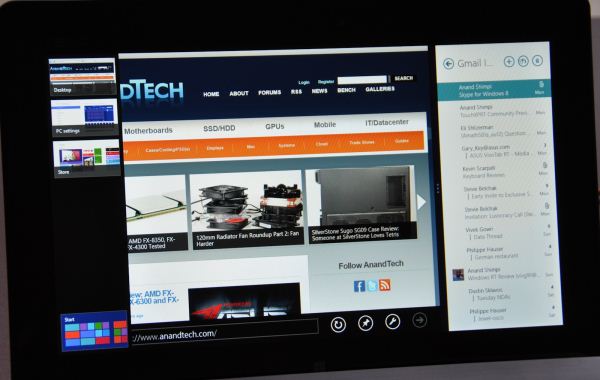The Windows RT Review
by Vivek Gowri & Anand Lal Shimpi on October 25, 2012 12:00 PM EST- Posted in
- Windows RT
- Operating Systems
- Microsoft
- Mobile
- Windows 8
- Tablets
Final Words
So, ten thousand words later, what can we take away from Windows RT? It’s definitely another superb user experience design from Microsoft. Say what you will about Windows Phone 7, but damn if that UI isn’t gorgeous. The Metro design language translates over to the tablet form factor really well, resulting in the Windows Modern UI. We’ve obviously known how Modern UI looks and feels through the various Windows 8 preview builds, but Windows RT ends up being more focused and offering a more consistent experience. It’s a side effect of being limited to apps from the Windows Store - because you spend a significant majority of your time in the new Windows UI, desktop use is minimized. In Windows RT, the Windows Desktop serves the purpose of being the more capable and powerful layer underneath the main portion of the UI, as opposed to Windows 8, which sometimes feels like the new Windows UI existing as an impractical interface layer on top of the traditional desktop.
The dichotomy just feels more comfortable in Windows RT than I feel like it has been in the previous Windows 8 systems that I’ve dealt with. It’s nice. This is the first time I feel like I’ve really connected with the new Windows UI, it makes a ton of sense to me now. I still think for mouse-based navigation, you’re better off treating it as a glorified Start menu, but it’ll be interesting to see how legacy programs affect the use of Modern UI in x86-based Windows 8 tablets as the Windows Store matures.
If you’re really concerned about the state of third-party apps, you just have to wait and see. I’ve seen a lot of snap judgements made about Windows RT in the last couple of days based on the dearth of good applications in Windows Store, and while I agree with that sentiment, I feel like it’s extremely shortsighted to write off the ecosystem already. Neither version of the OS has gone on sale yet, and we know that there are a number of applications that will go live on the official release date, as well as many more coming in the weeks ahead.
This isn’t like Windows Phone, where we need to see whether the platform will get any market traction before predicting the growth of the app marketplace. You can basically assume that the marketplace will expand significantly unless somehow everyone stops buying Windows-based systems on October 26th. The odds of that situation arising seem relatively low, so my bet is that the strength of the ecosystem will be a non-issue a month from now.
The default inclusion of Office 2013 and the emphasis on physical keyboards makes Windows RT the first tablet platform to significantly address the question of productivity. Combined with the equally advanced task switching and multitasking built into the UI, and this becomes the first legitimately useful tablet operating system out there. The Galaxy Note 10.1 wasn’t bad, but it was a single device that built additional functionality into a custom Android skin. Every single Windows RT slate comes out of the box with Office and the ability to have multiple active application windows. It’s just a few steps ahead of competing tablet platforms at this point.
And it’s not like RT loses out on a content consumption front. It’s paired with what is a very strong entertainment store and gaming franchise in Xbox Live, and the browsing experience is definitely competitive. It’s also a competent e-reader, with Amazon’s Kindle being one of the headlining apps currently in Windows Store. It even matches the power efficiency of the other ARM-based tablets, with competitive battery life and standby time. Obviously, ARM is the driving factor in the low power consumption, but it’s good to see that Windows is on a similar level as iOS and Android.
So this is a tablet platform that can do a good job of replacing both an iPad and an ultraportable in a number of different workflows. You get the best of both worlds, in some sense - Windows RT tablets have similar form factors to the iPad and leading Android tablets, and offer near-equal battery life, performance, and user experience, but they also give you the added benefit of strong productivity applications and the power of Windows Desktop. From a conceptual standpoint, almost anything you can do with an iPad can be done equally well (or close) on a Windows RT tablet, but the desktop-caliber office suite and versatile multitasking interface of Windows RT are impossible experiences to replicate on the iPad. It's not a perfect operating system by any means, but it brings a new dimension to the tablet space. So if you’re looking for a new tablet this fall, Windows RT deserves your consideration.













233 Comments
View All Comments
Taft12 - Thursday, October 25, 2012 - link
You seem to have missed the way the app store phenomenon has depressed software prices. You may take quantity over quality but hardly anyone else does.SlyNine - Friday, October 26, 2012 - link
At least in your opinion. I'm with A5cent. Your point remains to be proven, right now its just your opinion.steven75 - Friday, November 2, 2012 - link
Apple's own AAA apps such as iPhoto, iMovie, Garageband, iWork are almost all $5.And they are FAR more capable than anything you can get on Metro right now.
MadMan007 - Thursday, October 25, 2012 - link
"This stage of the Tablet market"...I'm not sure what you could possibly mean there. This is the very early stage of tablet development. The iPad was released about 2 and a half years ago, that's nothing and I don't understand why people try to declare a market won when it's that new and still growing very fast.Dekker - Thursday, October 25, 2012 - link
What I mean is that developers will first write for iPad because it has an installed base of 100 million devices. Only much later will they write for less popular platforms. Some apps may not make it to RT at all. Overcoming the disadvantage of being the less attractive platform is very hard because of the self-reenforcing effects (ask Apple about their experience in the 90s when software support for the Mac faded).Not all is lost for MS, but they do not have much room for error or delay in the tablet space. As for Apple, the technology industry only grants temporary near-monopolies and they will not be on top forever.
MadMan007 - Thursday, October 25, 2012 - link
I guess if Apple continues their douchery of limiting which development tools developers can use then yeah. (Maybe they stoped that? It was in relation to Adboe tools iirc, not Flash.)Otherwise cross-platform developing will become the norm, with some necessary differences due to UI or what have you, and other tweaks as devs see fit. MS may provide some great dev tools to make this happen, even if it's just to port over to WinRT, and there are already dev tools to create apps for both WinRT and Win x86.
That last bit is where a lot of WinRT apps will come from. Devs making apps for what will be the huge Win x86 install base and just porting them to WinRT.
khanikun - Friday, October 26, 2012 - link
The difference so far is the iPad is a toy tablet. Windows RT is not. The benefit of a merger of toy tablet OS combined with a desktop OS.strangis - Friday, October 26, 2012 - link
Developers can target ALL Windows 8 computers with RT apps, which means the market will potentially be 300+ million people within a year.That far surpasses the iPad in exposure.
steven75 - Friday, November 2, 2012 - link
Except Metro is being widely panned for keyboard/mouse use.dysonlu - Friday, October 26, 2012 - link
I think the crucial points for a platform, and this may sound a bit controversial, are "hackability" and games. That's what jumpstarts a platform. Hackability: an underground scene for free apps and games or for other "illegal" use of the platform/device will lower the barrier of entry and thus increase adoption rate. The amount of people wanting free and illegal stuff can't be underestimated. Games, of course, more than any apps are what people download and buy compulsively. Games are compelling to everyone, from 7 years old to 77 years old users. Games are what people tell their friends about, they promote visibility and popularity of the platform.